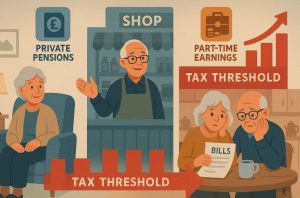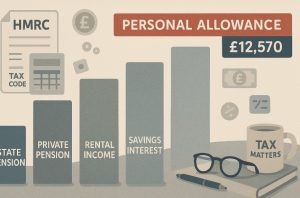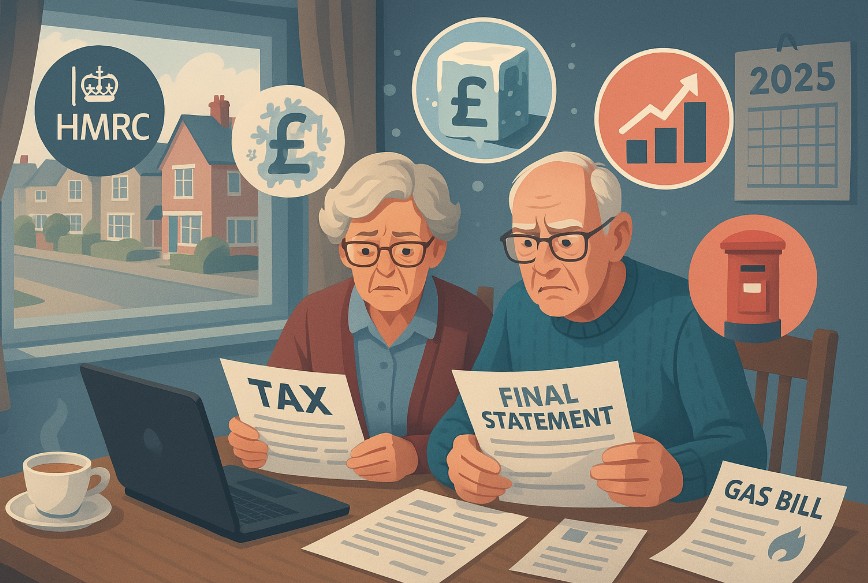Table of Contents
ToggleIn 2025, the UK finds itself at a critical juncture for retirees, as more pensioners than ever are being pulled into the income tax net. Despite no fundamental change in tax rates, pensioners are experiencing a rising financial burden, largely due to the government’s long-standing freeze on tax thresholds amid sharp increases in state pension payments.
The result is a subtle yet deeply felt pensioner income tax increase, which is reshaping retirement prospects across the country.
According to recent analysis, some pensioners are now paying £2,729 more in tax annually than they were four years ago, just to maintain the same standard of living. This equates to a 54 percent rise in their tax burden, not because of irresponsible financial decisions or significant wealth gains, but because of what many are calling a stealth tax engineered by fiscal inaction.
What Is the 2025 Pensioner Income Tax Increase and Why Is It Happening?

The term “pensioner income tax increase” may suggest new legislation or a direct rise in tax rates. However, the reality is more complex and, arguably, more concerning. The increase has occurred as a result of the government’s decision to freeze the personal allowance at £12,570, a policy in place since 2021 and set to continue until at least 2028.
During the same period, the state pension has risen considerably, thanks to the triple lock mechanism, which guarantees pension increases in line with inflation, earnings, or 2.5% whichever is highest.
This divergence between static tax thresholds and rising pension income has created what economists refer to as fiscal drag. As retirees’ incomes gradually rise to keep up with inflation and living costs, they cross the frozen thresholds and become liable for income tax—even if their spending power has remained constant or even decreased. It’s a quiet shift, but its consequences are profound.
What Are the Key Tax Thresholds and Figures for UK Pensioners in 2025?
For the 2025–26 tax year, the full new state pension will rise to £11,973 per year. With the personal allowance frozen at £12,570, this leaves just under £600 of untaxed space before any additional income becomes taxable. Any private pensions, interest from savings, part-time earnings, or rental income can easily push a pensioner above the threshold.
It’s important to note that the state pension is paid gross, meaning no tax is deducted at source. This has led to many pensioners being surprised by unexpected tax bills.
In some cases, HMRC has demanded as much as £2,000 from individuals who did not realise their growing state pension entitlement had tipped them into taxable territory. As many as 650,000 more pensioners are expected to become taxpayers in 2025–26 as a result of this dynamic.
Who Will Be Affected by the Pensioner Income Tax Hike?

The impact of the tax increase is not uniform across all retirees. The hardest hit are those who receive both the full state pension and any additional income, whether from private pensions, annuities, property, or part-time work.
In fact, even relatively modest financial planning efforts—such as building up a small private pension pot, can now result in significant tax liabilities, despite intentions to secure a modest, comfortable retirement.
For example, a pensioner aiming for a “comfortable” lifestyle as defined by the Pensions and Lifetime Savings Association (PLSA) now needs £43,100 post-tax per year, up from £32,800 in 2020–21.
Four years ago, achieving that lifestyle came with an income tax bill of around £5,058. In 2025, that figure is expected to reach £7,787, a drastic increase without any real improvement in quality of life.
This shift is particularly frustrating for retirees who believed they had done everything right. They saved diligently, worked for decades, and built up pension pots that they expected would sustain them. Now, these individuals are finding themselves paying significantly more tax—simply to stand still.
Impact of 2025 Income Tax on Different Pensioner Profiles
| Pensioner Profile | Income Sources | Total Annual Income | Tax Payable (2024–25) | Comments |
| State-only pensioner | Full new state pension (£11,973) | £11,973 | £0 | Below the personal allowance threshold |
| Modest private income | State pension + £3,000 private pension | £14,973 | ~£481 | Taxable income of £2,403 above allowance |
| Part-time worker | State pension + £6,000 part-time job | £17,973 | ~£1,081 | Additional earnings push income significantly over threshold |
| Comfortable lifestyle | State pension + £32,000 private/other income | £43,973 | ~£7,787 | Approximates “comfortable” retirement; high tax liability |
| Dual pensioner couple | Two state pensions + £6,000 savings income | £29,946 | Varies (joint treatment) | Couples’ tax situation depends on individual earnings and allowances |
This table highlights how even modest additional income sources can lead to notable tax obligations, especially when thresholds remain frozen. It also underscores how difficult it has become for pensioners to plan for retirement in a stable financial environment.
What Income Is Taxable for Pensioners in the UK?

Taxable income for pensioners includes a broad range of revenue sources. The primary components are:
- State Pension
- Private or occupational pensions
- Part-time employment or self-employment
- Rental income from property
- Dividends and interest above savings allowances
- Annuity payments and foreign pension income
Although the state pension is taxed, it is not taxed at the point of payment. Instead, HMRC applies tax through the pensioner’s tax code, often collecting it from other sources like private pensions. This method can lead to confusion and surprise tax bills, particularly for those who only recently began receiving both state and private pension income.
Analysis by Sir Steve Webb, a former pensions minister, found that before April 2025, around 249,000 pensioners were already paying at least £1,000 in tax on their state pensions alone.
Of these, over 10,000 retirees were paying £2,000 or more, a stark demonstration of how frozen thresholds are turning modest pensioners into taxpayers.
How Will the Pensioner Income Tax Increase Impact Everyday Finances?
The consequences of the income tax increase go far beyond HMRC letters. They strike at the heart of retirement security. A lifestyle once considered attainable on a modest pension now requires much more planning and much more income.
The PLSA’s definition of a comfortable retirement includes factors that many would consider standard, not luxurious: a small car replaced every five years, £70 a week for groceries, a couple of meals out monthly, a two-week European holiday once a year, and the ability to give modest gifts or contribute to family needs. It also includes essentials like home maintenance every decade and broadband and TV packages.
What’s alarming is that to maintain this lifestyle, a pensioner now needs over £10,000 more per year (post-tax) than they did just four years ago.
Yet most of that increase is being consumed by rising costs and taxes—not by additional luxuries or quality-of-life improvements. For many, the increase in their pension income is being fully offset by these tax demands.
What Tax Planning Strategies Can Retirees Use in 2025?

In light of the growing tax burden, pensioners should take proactive steps to minimise their liability where possible. Though complex, there are legitimate methods to manage retirement income more efficiently.
Using tax-free savings vehicles like ISAs can help shield interest and investment income. Pensioners can also make use of the Personal Savings Allowance, which allows basic rate taxpayers to earn up to £1,000 in interest tax-free.
For couples, the Marriage Allowance can be used to transfer a portion of the personal allowance to a spouse with lower income, potentially reducing the household’s tax bill.
In some cases, spreading pension withdrawals across multiple years or adjusting the timing of income receipts can help avoid triggering tax liabilities. Retirees should also check their tax codes carefully and seek advice from financial advisers, especially when drawing from multiple income sources.
How Are Experts and the Public Responding to the Tax Changes?
Reaction to the pensioner income tax increase has been swift and largely negative. Critics argue that it disproportionately affects those who took a responsible approach to retirement.
Jon Greer, head of retirement policy at Quilter, described the impact of fiscal drag as “quietly reshaping the pensions landscape”, warning that retirees are now facing an environment where tax is eroding the very security they worked hard to build.
Public sentiment echoes this concern. Many retirees feel betrayed by a system that promised support in old age, only to introduce stealth measures that claw back those benefits through complex tax structures.
Advocacy groups like Age UK and Silver Voices have called on the government to raise thresholds or at least index them to inflation, to ensure pensioners are not punished simply for receiving what they are due.
2024 vs. 2025 Pensioner Income Tax Comparison
| Category | 2024 Rate | 2025 Rate | Difference |
| Personal Allowance | £12,570 | £12,570 (Frozen) | No Change |
| Full New State Pension | £10,600 | £11,973 | +£1,373 |
| Comfortable Retirement (Post-tax) | £32,800 | £43,100 | +£10,300 |
| Average Tax Paid by Pensioners | £5,058 | £7,787 | +£2,729 |
What Does the Future Hold for Pension Taxation in the UK?
The future appears uncertain. With the Office for Budget Responsibility forecasting a 4.6% increase to the state pension in 2026, the full new pension could rise to £12,520 per year, just £50 shy of the personal allowance. Another increase in 2027 would tip the balance completely, making tax payments inevitable for even those receiving only the state pension.
Unless tax thresholds are adjusted in future Budgets, this scenario will become reality for millions. Chancellor Rachel Reeves has not yet committed to lifting the freeze, leaving open the possibility that more pensioners will find themselves taxed on income they once assumed would be protected.
This creeping tax burden is more than just a policy issue—it is a challenge to the notion of retirement itself. With rising energy costs, food prices, and housing expenses, pensioners are being asked to pay more for less. And unless meaningful reforms are introduced, retirement in the UK will continue to become less secure for future generations.
Frequently Asked Questions
Will the state pension be taxed in 2025?
Yes, if your total income exceeds the personal allowance, your state pension becomes taxable, even if you have no other income sources.
Why am I paying more tax if my lifestyle hasn’t changed?
Because tax thresholds are frozen while inflation and pension increases raise your income on paper, leading to tax bills for the same standard of living.
How many pensioners will be paying tax in 2025?
An estimated 650,000 additional pensioners are expected to cross the tax threshold this year due to rising pension amounts.
Can I reduce how much tax I pay in retirement?
Yes. Strategies like using ISAs, timing pension withdrawals, and claiming the Marriage Allowance can help reduce your liability.
Is this tax increase permanent?
The government has not announced any plan to raise tax thresholds, so this situation may persist until at least 2028.
What is fiscal drag?
Fiscal drag occurs when inflation or rising earnings push people into higher tax bands while thresholds remain unchanged, effectively increasing taxes.
Should pensioners consult a financial adviser?
Yes, especially if receiving income from multiple sources, to ensure efficient tax planning and avoid unexpected liabilities.




